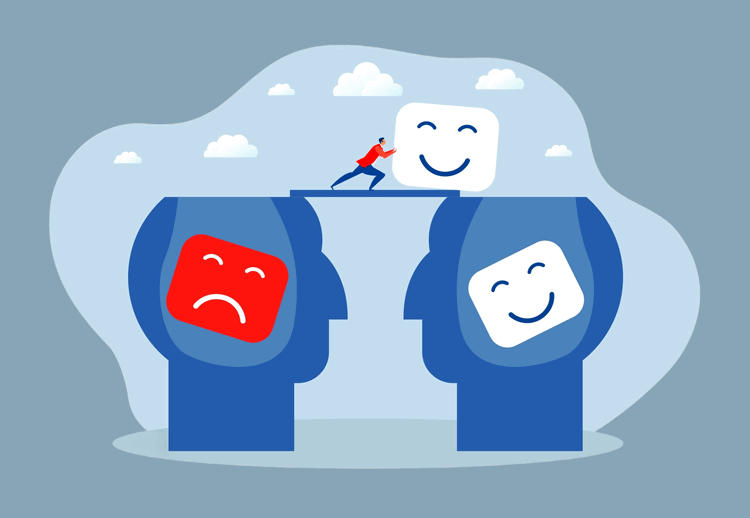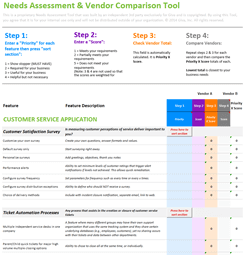Elevating Customer Experience with Personal Customer Service
With automation and mass communication dominating the business landscape, the art of personal customer service becomes an influential differentiator for companies seeking to build lasting relationships with their clientele. Gone are the days when generic, one-size-fits-all customer service strategies resonate. Today's consumers want recognition, understanding, and a sense of connection with the brands they choose to buy from.

In this comprehensive guide, we uncover the essence of personal customer service. We provide strategies and examples that not only meet but exceed the expectations of today's consumer. Learn the power of personalization in customer service and how it can elevate your business in a competitive market.
What is Personal Customer Service?
Personal customer service focuses on treating each customer as an individual, with unique needs, preferences, and expectations. It is about going beyond the standard script and generic solutions to offer tailored interactions. These help make each customer feel valued and understood. This approach leverages personalization, empathy, an understanding of the customer's journey, and an overall attention to detail to create a memorable and positive experience.
Why Personal Customer Service is Important
Traditional customer service, which is the term we will use to describe the alternative, often relies on one-size-fits-all responses. Besides heavily scripted interactions, this method uses generic solutions that aim to address the average customer's needs. While this approach can be efficient for handling common issues, it may fall short in providing personalized attention and understanding. Traditional customer service tends to prioritize quick resolution over individual customer experiences. This can lead to a lack of emotional connection and a sense of being just another number in the system.
Personal customer service is more encompassing. It can turn a simple transaction into a meaningful interaction, setting the stage for loyal customers to your brand.
Watch Our Video On Mastering Personal Customer Service: 18 Strategies and Examples for Success
18 Comprehensive Strategies for Personal Customer Service
-
Using Customer's Name
What is it? Using the customer's name in interactions to create a more personal and friendly atmosphere.
Why is it important? Addressing customers by their name helps in building a rapport and makes the interaction feel more personal. According to a study by Accenture, "more than one in two consumers (56%) are more likely to shop at a retailer in store or online that recognizes them by name."
Example in business: A coffee shop barista addressing a regular customer by their first name when taking their order, making the customer feel recognized and valued. For example, "Good morning, John, good to see you again today, can I get your regular caramel macchiato beverage going?"
-
Familiarizing Yourself with Customer History
What is it? Keeping track of a customer's previous interactions, purchases, and preferences to provide more tailored service.
Why is it important? Understanding a customer's history allows businesses to offer relevant recommendations and solutions. This can enhance the overall customer experience and possibly increase the overall "basket size" — an important metric for retailers.
Example in business: An online retailer tracking customer purchase history and preferences to offer personalized product recommendations and promotions. In this instance, think of Amazon — before you proceed to your cart, they display a "Need anything else?" page, showing you items you have bought frequently in the past, as well as other items they believe you might like based on your purchase history.
-
Sharing Your Identity
What is it? Service representatives introducing themselves by name and sharing relevant personal details to create a more human connection.
Why is it important? There is a fine line to draw with this one. You want to share, but you certainly do not want to overshare. Nobody wants to know about personal family drama or the like! Personalizing the interaction by sharing your identity and finding some common ground between yourself and the customer can help in building trust and rapport.
Example in business: A hotel front desk agent introducing themselves by name and providing personalized recommendations for nearby attractions or dining options. The interaction could involve the front desk agent mentioning specific places they have been for dinner. They can even note specific dishes they have tried and liked.
-
Demonstrating In-Depth Product Knowledge
What is it? Providing customers with detailed and accurate information about products or services to help them make informed decisions.
Why is it important? Customers value expertise. They are more likely to trust and purchase from businesses that demonstrate a deep understanding of their offerings. If your employees show confidence when speaking about your products, a customer is likely to return.
Example in business: Let us imagine that a customer visits your plumbing parts shop to outfit a new natural gas BBQ. To ensure safety, the customer needs the correct advice (and parts of course). If the employee is not confident, or provides the wrong piece for connection, not only could you risk your customer's safety, but they may also write negative reviews online, and never shop with you again. As a business owner, it is in your best interest to ensure your employees are confident and knowledgeable.
-
Adopting a Friendly Tone
What is it? Using a warm and approachable manner in customer interactions to create a positive and welcoming atmosphere.
Why is it important? A friendly tone can put customers at ease, making them more likely to engage with you in banter. This can also allow them to feel more free to ask questions, hopefully resulting in a purchase and repeat business.
Example in business: A customer service representative engaging in casual conversation with a caller while resolving their issue, creating a relaxed and positive interaction. This can be something as simple as asking how the weather is in the customer's location. Or it can even be asking more specifically about how they plan to use the specific product or service. The latter can offer up the opportunity to tailor the customer service being provided. Ensure you read the room before you take this approach though - some customers are more private and can take your targeted questions the wrong way!
Read more about Friendly Customer Service.
-
Utilizing the Right Customer Support Software
What is it? Implementing software tools that enable efficient and personalized customer support, such as CRM systems, live chat, and customer service ticketing software.
Why is it important? The right software can streamline support processes, provide valuable customer insights, and facilitate personalized interactions.
Example in business: A software company implementing a CRM system that allows support agents to access customer data quickly, such as what they previously phoned in about. Following a thread, this can assist customer service agents in picking up what the issue might be. Or it can at least help them not repeat the same troubleshooting that the agent before undertook. That, alone, can save your customer plenty of frustration.
Free 30-Day Trial: Giva Customer Service Software in the Cloud
-
Expressing Gratitude
What is it? Showing appreciation to customers for their business and loyalty, often through thank-you messages, rewards, or free-to-join loyalty programs.
Why is it important? Expressing gratitude can strengthen customer relationships, increase loyalty, and encourage repeat business. Remember, customers want to feel like they are more than just a number. They want to feel like their investment at your business is recognized and appreciated.
Example in business: An e-commerce business sending personalized thank-you notes, with a 15% discount code off the next purchase to first time buyers. Businesses can also implement free-to-join loyalty programs. Then, after a certain number of purchases or money spent, customers can redeem points for a free product or other reward. The reward does not need to be directly related to products at your business (ex. gas cards or coffee cards).
-
Making It Easy to Get in Touch
What is it? Offering multiple channels for customer support, including phone, email, live chat, and social media platforms, to accommodate diverse customer preferences.
Why is it important? Providing easy access to support ensures that customers can reach out through their preferred method. This can lead to higher satisfaction. According to a report by HubSpot, "90% of customers rate an "immediate" response as important or very important when they have a customer service question."
Example in business: A telecommunications provider offering multiple channels for customer support, including phone, email, live chat, and social media. Businesses like telecommunications and airlines can have a higher volume of customer inquiries, as well as a wider customer demographic. For instance, a millennial may be more tech-savvy and prefers a live chat or even a WhatsApp solution. A baby boomer might prefer a more traditional means of communication, like a telephone call.
-
Knowing How to Close the Conversation
What is it? Ensuring that the customer is satisfied and all their concerns have been addressed before concluding the interaction.
Why is it important? Properly closing a conversation leaves a lasting positive impression. It also helps ensure that the customer feels their issues have been fully resolved.
Example in business: A retail store associate ensures that a customer leaves satisfied by asking if there is anything else they can assist with before concluding the interaction. While it's important to ask if they need further assistance, it's equally important to ensure that your inquiry comes across as sincere and not scripted. If you make the customer feel as though they are a bother, they likely are not leaving happy.
-
Tailoring Recommendations and Suggestions
What is it? Offering personalized recommendations and suggestions based on a customer's past interactions, preferences, or purchase history.
Why is it important? Personalized recommendations can enhance the customer experience by making them feel understood and catered to, potentially leading to increased sales and loyalty.
Example in business: A tailor not only helps a regular customer purchase the perfect suit for an upcoming business conference, they also recommend accessories that complement their style, such as new shoes, cufflinks, and a snazzy tie. Knowing their preferences from past interactions, the recommendations are tailored to enhance the customer's overall look. This can help make the suggestions feel more like a benefit than an upsell.
-
Offering Customized Solutions
What is it? Creating personalized solutions that meet the specific needs and requirements of individual customers.
Why is it important? Customized solutions demonstrate a commitment to meeting the unique needs of each customer, which can lead to higher satisfaction and loyalty.
Example in business: An interior designer collaborating with clients to create personalized design plans that reflect their unique style, budget, and functional requirements. A design book might have set templates. Yet, an interior designer who goes the extra mile by picking bits and pieces from various pages to make their client happy goes a long way. Sure, it might be a bit more work, but it could mean more money, returning business and referrals.
-
Providing Personalized Discounts or Offers
What is it? Creating special offers or discounts tailored to the individual customer based on their preferences, purchase history, or loyalty status.
Why is it important? Every customer loves a good deal, especially when it is on a product they really want or need. Tailoring discounts to specific customer sets can lead to a sense of value, appreciation and loyalty.
Example in business: An online clothing retailer sending exclusive discount codes to customers on their birthdays or based on their favorite product categories, incentivizing them to make a purchase. For example, if a customer purchases a pair of yoga pants and then frequently adds similar items to their cart without completing the purchase, it may indicate hesitation. In such cases, sending an exclusive discount code to encourage the customer to complete the purchase could be a good move. This strategy not only incentivizes sales but also demonstrates an understanding of the customer's needs and preferences.
-
Anticipating Customer Needs
What is it? Proactively identifying and addressing customer needs before they have to ask, based on their previous interactions and preferences.
Why is it important? Most people want to get what they are looking for and be on their way. Scrolling through categories of products or coming up short via a product search bar is never a satisfying experience. Needless to say, anticipating your customers' needs can enhance their experience by getting them in and out with the item they were after as quickly as possible.
Example in business: A hotel concierge proactively offering restaurant reservations or transportation arrangements to guests based on their itinerary or preferences, enhancing their overall stay experience.
-
Creating Personalized Loyalty Programs
What is it? Designing loyalty programs that offer rewards and benefits tailored to the individual preferences and behaviors of each customer.
Why is it important? Personalized loyalty programs can increase customer engagement and retention by making members feel recognized and rewarded for their unique contributions to the brand. These customers end up becoming your repeat customers and best brand advocates.
Example in business: Travel retailers are some of the most notorious for offering loyalty programs. For example, airlines offer programs that reward travelers with flight bookings based on the number of miles spent. Hotel chains offer guests free nights after a certain number of stays. The more you travel, the more you earn in complimentary accommodations or other handy rewards.
-
Hosting Exclusive Events or Workshops
What is it? Organizing special events or workshops that are only available to your customers, providing them with unique experiences and added value.
Why is it important? Exclusive events can strengthen customer relationships. This can create a sense of community, and enhance brand loyalty by offering experiences that are not available to the general public.
Example in business: A fitness studio organizing member-only workout classes or nutrition seminars, sometimes hosted by influential speakers and trainers. These types of events can add tremendous value, motivation and sense of community for your clients.
-
Sending Personalized Follow-Up Communications
What is it? Following up with customers after a purchase or interaction with personalized messages that include product usage tips or recommendations for related products.
Why is it important? Personalized follow-up communications can improve customer satisfaction by providing helpful information. This helps show that the business cares about their experience. It can also encourage repeat purchases by suggesting relevant products.
Example in business: A telecommunications business that sells smartphones sending FAQs or an infographic after a purchase to help customers with basic troubleshooting and getting to know any cool tips to do with their new device.
-
Providing Dedicated Customer Support Representatives
What is it? Assigning specific customer support representatives to individual customers or accounts, ensuring personalized, consistent and dedicated service.
Why is it important? Dedicated support representatives can build stronger relationships with customers, understand their needs better, and provide more effective solutions. These agents usually service higher grossing accounts and can be seen as a value add.
Example in business: A software company assigning dedicated account managers to enterprise clients. They serve as a single point of contact for personalized assistance and support. Rather than waiting in a general cue, larger accounts have more direct access to someone who knows their business needs and services them exclusively.
-
Celebrating Milestones and Special Occasions
What is it? Acknowledging and celebrating important milestones or special occasions in your customers' lives or their journey with your brand.
Why is it important? Celebrating milestones helps deepen the emotional connection with customers. This can help make them feel valued and appreciated. This emotional bond can lead to increased loyalty, advocacy, and customer lifetime value.
Example in business: Starbucks provides a great example of celebrating milestones. They offer customers a free food or drink item on their birthday. This small gesture is a well-known policy that goes a long way in making customers feel special and appreciated.
The Bottom Line: The Impact of Personal Customer Service on Business Success
The power of personal customer service lies in its ability to transform ordinary interactions into extraordinary experiences.
In a world where many businesses sometimes seem to take their customers for granted, limited communication channels, robotic replies, and inadequate post-purchase support are all too common.
By incorporating the personal customer service examples we've discussed into your overall strategy, you can create a lasting impact that sets your brand apart from the rest.
Giva Can Help You Elevate Your Customer Service
Our Customer Service Software solution offers features like real-time dashboards, automated ticketing, and customizable self-service portals to streamline support and enhance personalization.
With Giva, you can efficiently manage customer inquiries, track performance metrics, and deliver tailored support that meets the unique needs of each customer.
Gather your requirements by using our free needs assessment tool or start a free trial today!





